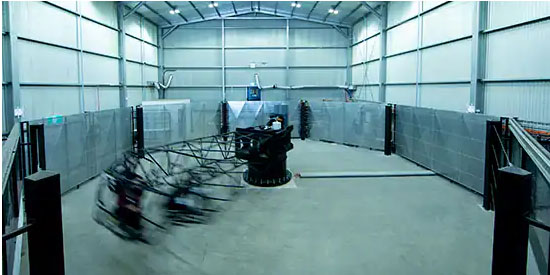Deakin professor named Australian 'Space Researcher of the Year'
Media release
A Deakin University professor has been named Australia’s leading space researcher for his pioneering work that includes the development of all-terrain robots for potential use on the Moon and Mars and Australia’s first high-G astronaut training simulator.
Pro Vice-Chancellor (Defence Technologies) and Director of the Institute for Intelligent Systems Research and Innovation (IISRI), Alfred Deakin Professor Saeid Nahavandi, received the award at the 2021 Space Connect Australian Space Awards that recognise leading individuals and businesses driving the development of Australia’s space economy.
In a career spanning more than 30 years, Professor Nahavandi is globally recognised for his pioneering research into intelligent robotic and haptic systems, with many of his modelling and simulation technologies used in civilian and defence applications.
Professor Nahavandi said he was delighted to be involved in Australia’s burgeoning space industry.
"It is very exciting to contribute to Australia’s space capability," Professor Nahavandi said.
"Deakin has a wealth of expertise to contribute to this industry."
Professor Nahavandi said he was confident that Australia’s space industry has a strong future.
"With satellites already underpinning many aspects of our daily lives, such as weather forecasting, emergency management, agriculture, GPS, internet access and online banking, I believe Australian astronauts will be in space in the not-too-distant future," he said.
Of his recent research achievements, Professor Nahavandi is most proud of pioneering the design, development, evaluation and human(self)-test of an Australian-first, high-G centrifuge prototype, called CYCLONE. This provides G-tolerance training for astronauts in carrying out space exploration tasks, as well as for pilots in handling high-speed aircraft manoeuvrability.
As the first short-radius, high G-force training simulator in Australia, CYCLONE has the potential to negate the need for Australian astronauts and scientists to go overseas for their physiological training and performance assessment under high gravity environments, leading to establishment of Australian sovereign capability in space and aerospace science and exploration.
Deakin Vice-Chancellor Professor Iain Martin congratulated Professor Nahavandi on this outstanding achievement.
"Deakin is delighted that Professor Nahavandi has received this accolade. It is testament to his many years of leadership, passion and collaboration at the forefront of intelligent systems research and innovation," Professor Martin said.
"The work of Professor Nahavandi and this team positions Deakin, particularly through IISRI and several other research Institutes and Centres, in a leading position to help drive Australia’s growing and exciting space industry and contribute to new jobs and opportunities in a rapidly evolving high-tech sector of the Australian economy."
Share this story

